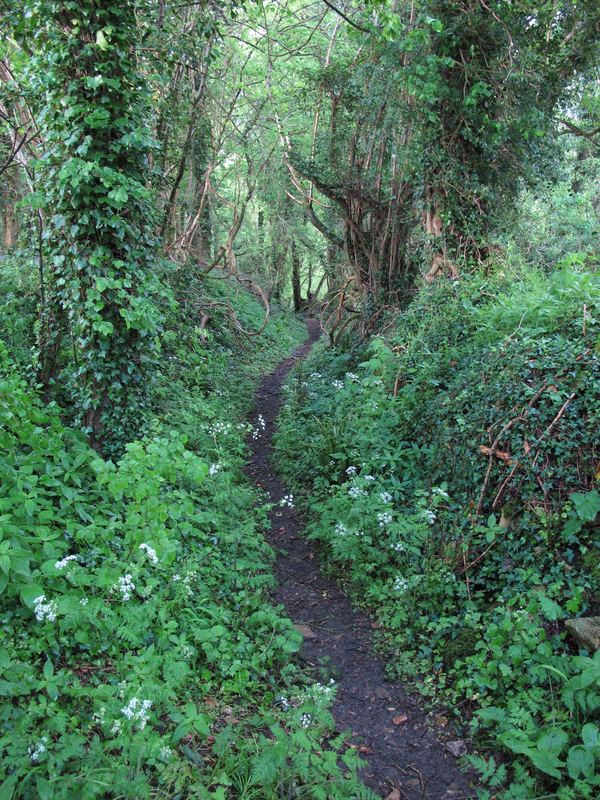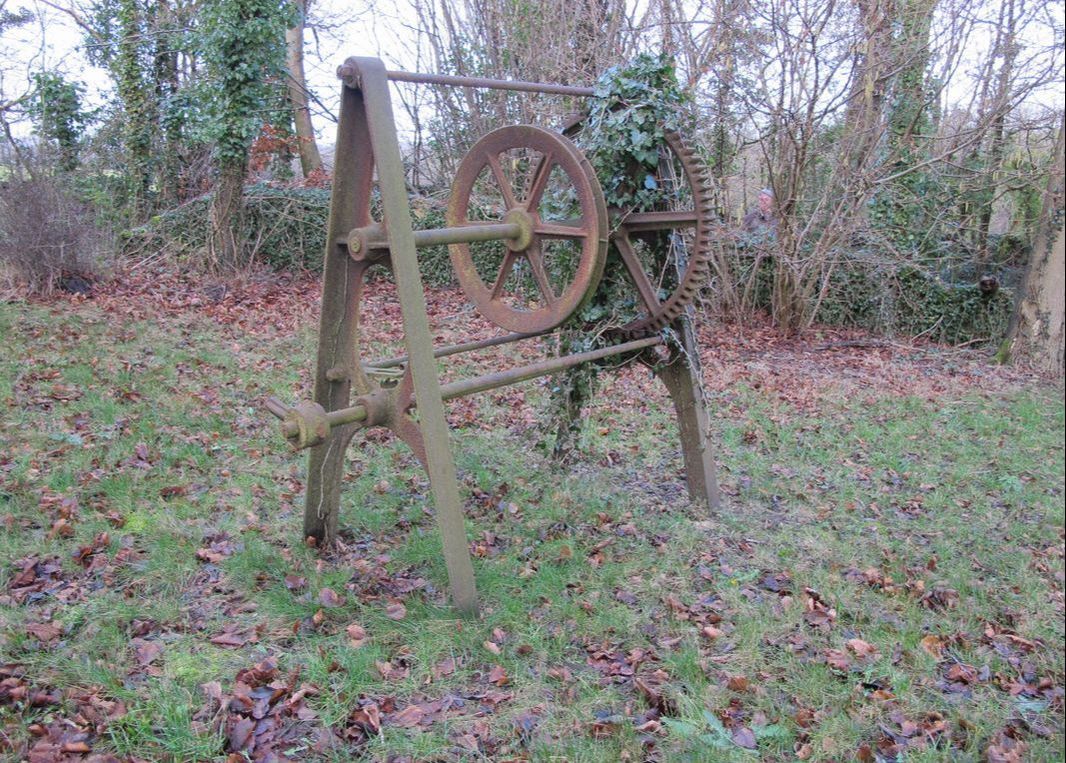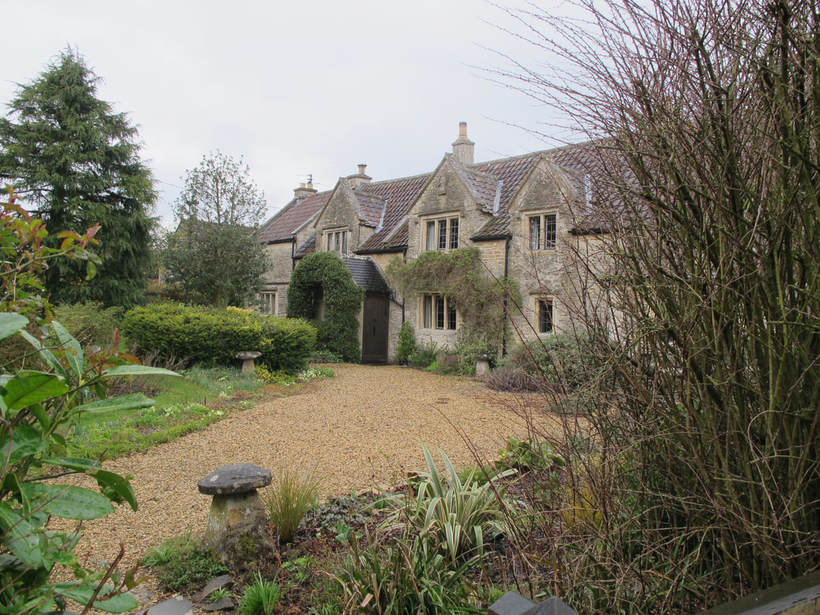|
Memories of World War 2
From Australia Peter Harrington November 2017 Remembering Box in Wartime I have been given an iPad and am learning to use it. I am 81 now and my wife Jenny is 80. I emigrated to Australia in 1959 and have lived here ever since. I want to use the iPad to find the places I lived in during my childhood, one of which is Box. My Parents I was born in 1936 in Wimbledon, Surrey. My mum Lily and dad Edward George Harrington met at a toy factory (Tri-ang Toys). Dad was training to be a paint chemist and mum helped with the moving of the toys. Mum was born a Cockney in Stepney Poplar. Dad's a Londoner from Croydon, so I have mum's humour and dad's communicating skill with people, which I enjoy. When the war broke out in 1939 I was three years old and we were all living at 8 Thurleston Avenue, Merton, Surrey where dad was officially called a Metro Cellulose Colour Mixer. |
When the war started my father was already registered serving with Merton and Moredon Auxiliary Fire Service. Probably his knowledge of chemicals was useful to assess factory fires. I remember my mother coming in all hours of the night saying come on quickly out into the shelter. I remember hearing the air raid siren sounding. Meanwhile dad was fighting the fires in London and we would wait until the siren sounded to give the all clear so we could go back in the house. Later we were evacuated to Buxton, Derbyshire, living in boarding house. I remember it was winter as we went sledging on some hills called Solomon's Temple.
|
Moving to Box
In 1943 my mother, brother, and I went to live in the cottage in the grounds of Hatt House whilst my father stayed up in London to fight fires. l remember the cottage quite well even though I was only six or seven years old - no water, only a well, no gas, no power and toilet at the back. After an air raid when the all-clear siren had sounded, we would gradually venture out onto the street to look for shrapnel that had come down. When the night-time siren sounded we had to make sure our curtains were drawn and the lights out otherwise an air raid warden might cycle past and shout Get that light out or knock on the door. |
I remember that, as I turned off the main road, down the lane (the Drilley), there was a small letter box built into the wall. As I walked down the lane there was a farm on the left (Blue Vein Farm) and my cottage on the right (then called Hatt Cottage, now Keeper's Cottage). I'm not sure but the farmers name was Morris or Stone - I am a bit vague there. They were very friendly even let me get involved with certain jobs not forgetting the safety issue of course. Looking back it was fun and interesting.
Other things that come to mind are dad telling me about the time he was riding his bike near the aerodrome when he heard a humming noise so he thought it could be a V2 Rocket. He fell off his bike into a ditch because when the humming noise stops you don't know where the bomb will fall and explode. Other things that come to mind are when I was going to school one morning
I heard this strange noise. I looked up and saw a group of planes, bombers, fighters, above me, l don't know what they were but they frightened me in case they were German planes.
We were there about two or three months I think. My mother walked to the house to work in the kitchen. I remember walking to Box School and some times I would get a lift in a Great Western Railway truck. I also remember going over to Hatt Farm to see the animals and to watch the people harvest the wheat and corn. I read your interesting history about Hatt House going back 1630-40 in which it mentioned the Manor and the neglected cottage where I must have lived it is interesting history to me.
Other Wartime Memories
I saw an estate car being used with a fuel bladder on top instead of an internal petrol tank. They were made of several layers of rubber with a self-sealing ability to prevent spillage in the event of being hit by enemy fire and causing an extensive fire. Many of them were made by Goodyear in USA. Another strange thing I remember was strips of silver material called chaff, about one or two inches by about two inches, lying in the fields as I walked to school. I remember hearing from someone that the strips interfered with the navigation on German bombers but the probable answer was that the German planes released them to interfere with British radar.
I remember sticking brown strips of paper that we licked to stick onto the window to stop the glass shattering into the room.
Iron railings were collected from people's houses to help with the war effort. My young brother was placed into a large gas mask the size of a 10 gallon drum. My mother and I would pump air into the mask to help with fresh air. Last of all, I still recall whale meat and ration books.
Later in the wartime we lived with my uncle in Chippenham and my dad and uncle went to work at the aircraft factory in Bristol.
I went to Frogwell School where the head master's name was Mr Rice, a nice, friendly man. I remember an American Army camp to which my brother and I went and spoke to them so they gave us some gum. There was an Italian prisoner-of-war camp down the road.
Eighty Years Later
I am in a wheelchair now most of the time although I do walk with a frame. The physio has said osteoarthritis & spinal cord damage. To think that I have found people on the other side of the world who are interested in my life in Wiltshire during the war !
I heard this strange noise. I looked up and saw a group of planes, bombers, fighters, above me, l don't know what they were but they frightened me in case they were German planes.
We were there about two or three months I think. My mother walked to the house to work in the kitchen. I remember walking to Box School and some times I would get a lift in a Great Western Railway truck. I also remember going over to Hatt Farm to see the animals and to watch the people harvest the wheat and corn. I read your interesting history about Hatt House going back 1630-40 in which it mentioned the Manor and the neglected cottage where I must have lived it is interesting history to me.
Other Wartime Memories
I saw an estate car being used with a fuel bladder on top instead of an internal petrol tank. They were made of several layers of rubber with a self-sealing ability to prevent spillage in the event of being hit by enemy fire and causing an extensive fire. Many of them were made by Goodyear in USA. Another strange thing I remember was strips of silver material called chaff, about one or two inches by about two inches, lying in the fields as I walked to school. I remember hearing from someone that the strips interfered with the navigation on German bombers but the probable answer was that the German planes released them to interfere with British radar.
I remember sticking brown strips of paper that we licked to stick onto the window to stop the glass shattering into the room.
Iron railings were collected from people's houses to help with the war effort. My young brother was placed into a large gas mask the size of a 10 gallon drum. My mother and I would pump air into the mask to help with fresh air. Last of all, I still recall whale meat and ration books.
Later in the wartime we lived with my uncle in Chippenham and my dad and uncle went to work at the aircraft factory in Bristol.
I went to Frogwell School where the head master's name was Mr Rice, a nice, friendly man. I remember an American Army camp to which my brother and I went and spoke to them so they gave us some gum. There was an Italian prisoner-of-war camp down the road.
Eighty Years Later
I am in a wheelchair now most of the time although I do walk with a frame. The physio has said osteoarthritis & spinal cord damage. To think that I have found people on the other side of the world who are interested in my life in Wiltshire during the war !


